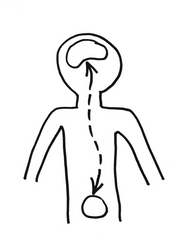Why is my child wetting the bed?
We all start off wetting the bed. The process of becoming dry is a learned one but, for some children, this subconscious skill takes longer to learn than others. Once a child is 5 years or older, bedwetting is classed as “monosymptomatic nocturnal enuresis” and there’s lots of evidence to suggest that treating bedwetting as soon as possible (once as child is 5 years old) is beneficial for a wide range of reasons.
Why is it happening?
The fundamental issue in the majority of children that wet the bed is that they have not yet developed the subconscious link that forms between their brain and their bladder. This developmental link alerts the brain when the bladder is full, so that when we are asleep we wake to use the bathroom.

Two other factors are often quoted as potentially contributing to nocturnal enuresis. The first factor is that certain children may produce too much urine overnight, hence their bladder becomes full, which may contribute to the problem. The other factor that has been postulated is that some children’s bladders contract in the night and they have an “overactive” bladder.
However, if the link between the bladder and the brain was fully functional, both of these factors would result in the child waking up to use the bathroom. As this does not occur, the prime factor that needs to be initially addressed is forming and strengthening the link between the brain and the bladder.
How can it be cured?
The bedwetting alarm works by helping a child to develop the fundamental link between the brain and the bladder. The importance of this link, over any other factor, is illustrated in the fact that bedwetting alarms have consistently been shown to be the most successful long-term treatment for nocturnal enuresis in ensuring long-term cures.
Other treatments, such as a synthetic anti-diuretic hormone (desmopressin), may temporarily reduce the amount of urine production but is often associated with a high rate of recurrence once the drug is stopped. This is due to the fact that the fundamental link between the brain and the bladder has not been addressed.
 Conclusion
Conclusion
So, the prime issue in the vast majority of bedwetting children is the delayed development of the link between their brain and bladder. The common cause for nocturnal enuresis is the lack of appropriate awakening on needing to use the bathroom, whatever the underlying reason. The target of the bedwetting alarm is to address this link and this is the reason why bedwetting alarms are the first line treatment in guidelines around the world. 

 Conclusion
Conclusion